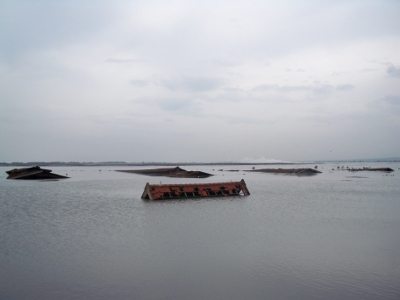As one of the richest and most powerful men in Indonesia, Aburizal Bakrie gets just about whatever Aburizal Bakrie wants. But to his frustration, Bakrie, the head of Golkar, the country’s second-biggest political party and the third-generation patriarch of the Bakrie family empire, can’t buy the thing he wants most – to be liked.
Popularity is the essential ingredient in the plot Bakrie is cooking up to become president in 2014. But all of his power and money can’t stop the force of nature that has become the politician’s worst public relations nightmare: Drilling by his family’s gas company is blamed for causing the world’s biggest mud volcano disaster. Sunday marked five years since the toxic sludge began spewing all over villages — and the Bakrie family name.
The mud has flowed continually since 2006, displacing more than 40,000 people and swamping at least 12 villages in Sidoarjo, East Java. Scientists predict the volcano will continue erupting right through Bakrie’s projected presidential term and beyond, for anywhere between 20 and 80 years.
The company, Lapindo Brantas, had been drilling for gas 200 meters away from the rice fields where the volcano formed. Many geologists point to the drilling as the cause, while the company blames an earthquake 280 kilometers away in Yogyakarta. Lapindo was relieved of responsibility by Indonesia’s notoriously corrupt Supreme Court, but under considerable pressure from the president and the public, the company agreed to pay some of the victims.
The Bakries had little choice. If their patriarch was to have any chance at winning the nation’s top job, they had to pay up as images of victims, sick children and flattened homes were splattered over newspapers and on TV.
Bakrie has tried to distance himself as much as possible from the volcano. At a panel discussion in 2007, he answered journalists’ questions on the volcano defensively: “You had better ask Lapindo, OK? I am the Minister, the Coordinating Minister of Social Affairs.”
Bakrie resigned on paper from all of his family’s companies in 2004 when he became chief economic minister, but is believed to still control much of Bakrie & Brothers’ business affairs. His brother Nirwan has become the official face of the conglomerate, which owns coal, telecommunications and property companies.
Nirwan Bakrie claims that Lapindo is not paying compensation, but that it is buying the land from the victims in an act of good faith.
“We felt that the society is very close to us. We always help people in disasters, in Aceh, Yogykarta, Bandung,” he said.
“Bakrie & Brothers has existed since 1942 in Indonesia and we always care about the people. Anything to do with a disaster, we’re always there.”
But the Bakries’ message is not filtering down to the people. Aburizal Bakrie’s personal approval ratings are low, and he is often seen as the enemy of reform. He spearheaded a campaign against the country’s leading reformist, Sri Mulyani Indrawati, who had told the president she would resign if the Bakries’ companies were given special treatment during the 2008 financial crisis. After going head-to-head with Bakrie over a bank bailout scandal, she did resign and took a senior position at the World Bank in the United States.
Hundreds of protesters gathered outside the Sidoarjo mayor’s office last week and addressed the Bakries and Lapindo directly: “Get out of Sidoarjo until you give us our money. You are not welcome here,” they yelled on megaphones.
Just one week before the eruption’s five-year anniversary, Lapindo missed its deadline to pay victims the final compensation installment, together worth US$140 million. The company says it has missed deadlines due to enormous losses in the 2008 financial crisis, and that it hopes to complete payment by the end of next year. Lapindo has plans to drill just 2.5 kilometers from the volcano in August, a plan protesters also rejected.
The family have tried hard to turn around their muddied image after a string of negative media reports, including a Tempo magazine cover that depicted Bakrie with the devil’s number, 666, superimposed on his forehead. Bakrie had initially threatened to sue Tempo, but eventually settled for a complaint with the Press Council.
In a more extreme attempt to win over the public and the mudflow victims, the Bakries in 2008 bought the Surabaya Post, based in Sidoarjo’s big, bustling neighboring city. The paper was facing closure when the Bakries added it to their media network.
Ross Tapsell from the Australian National University studied the paper’s takeover last year and spoke to reporters at the Surabaya Post, who said that their coverage of the disaster had been compromised since the Bakries bought the paper and appointed two former Lapindo executives as managers of the paper.
“Those inside the Bakrie empire say [Aburizal] basically just appointed two trusted employees, which is common when a media mogul buys a newspaper. But the result was very much self-censorship inside the newsroom,” Tapsell told Asia Sentinel. Tapsell points out that it is not uncommon for Indonesian politicians to own a media organization, which can be used as a political mouthpiece.
“The president has his own newspaper, Jurnal Nasional, and [National Democrat] Surya Paloh owns Media Indonesia. There is some legacy, perhaps, of the newspapers from back in revolutionary times in the 1940s, when chief editors were heavily involved in politics.”
Bakrie use of the Surabaya Post for political gain has not done him any favors. He has kept himself aligned with holdover crooks from the Suharto era — something he will need to rethink before the gun is fired for the presidential race. Winning the people’s trust while the sludge keeps flowing over Sidoarjo is a massive challenge indeed, and if Bakrie somehow wins the presidency in 2014, it will be perhaps the biggest PR spin-win in Indonesia’s recent political history.
Written by Angela Dewan
Source: Asia Sentinel

